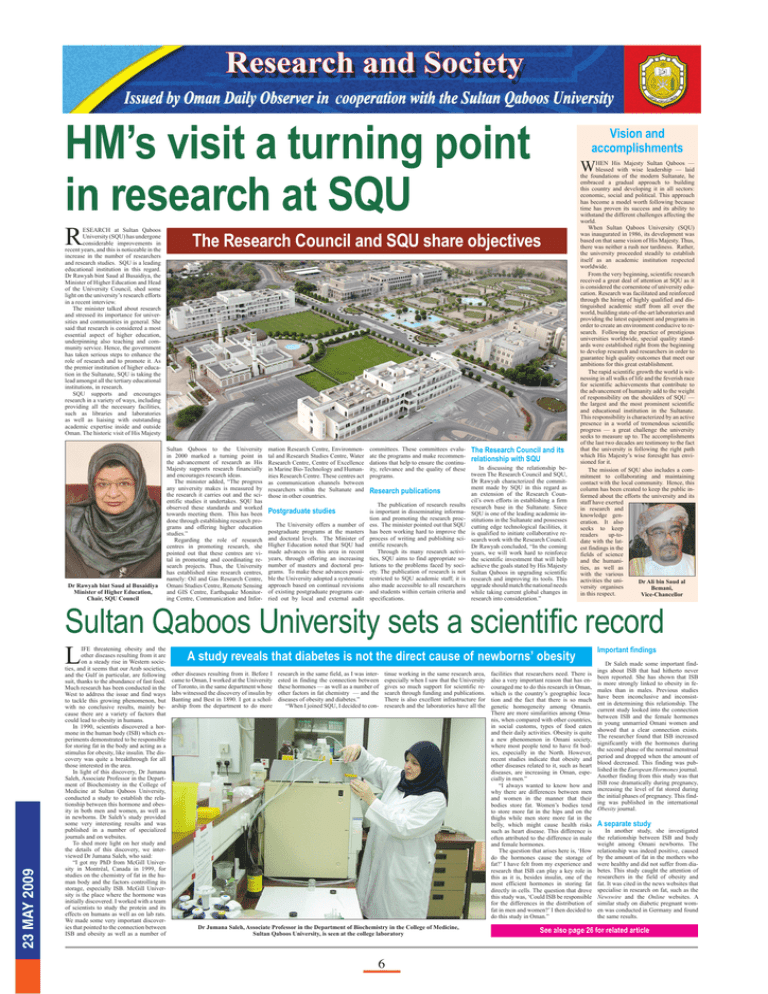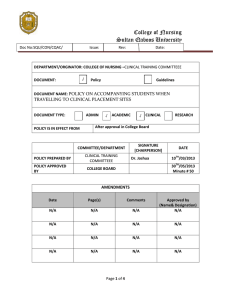L
advertisement

HM’s visit a turning point in research at SQU R ESEARCH at Sultan Qaboos University (SQU) has undergone considerable improvements in recent years, and this is noticeable in the increase in the number of researchers and research studies. SQU is a leading educational institution in this regard. Dr Rawyah bint Saud al Busaidiya, the Minister of Higher Education and Head of the University Council, shed some light on the university’s research efforts in a recent interview. The minister talked about research and stressed its importance for universities and communities in general. She said that research is considered a most essential aspect of higher education, underpinning also teaching and community service. Hence, the government has taken serious steps to enhance the role of research and to promote it. As the premier institution of higher education in the Sultanate, SQU is taking the lead amongst all the tertiary educational institutions, in research. SQU supports and encourages research in a variety of ways, including providing all the necessary facilities, such as libraries and laboratories as well as liaising with outstanding academic expertise inside and outside Oman. The historic visit of His Majesty Dr Rawyah bint Saud al Busaidiya Minister of Higher Education, Chair, SQU Council Vision and accomplishments W The Research Council and SQU share objectives Sultan Qaboos to the University in 2000 marked a turning point in the advancement of research as His Majesty supports research financially and encourages research ideas. The minister added, “The progress any university makes is measured by the research it carries out and the scientific studies it undertakes. SQU has observed these standards and worked towards meeting them. This has been done through establishing research programs and offering higher education studies.” Regarding the role of research centres in promoting research, she pointed out that these centres are vital in promoting and coordinating research projects. Thus, the University has established nine research centres, namely: Oil and Gas Research Centre, Omani Studies Centre, Remote Sensing and GIS Centre, Earthquake Monitoring Centre, Communication and Infor- mation Research Centre, Environmental and Research Studies Centre, Water Research Centre, Centre of Excellence in Marine Bio-Technology and Humanities Research Centre. These centres act as communication channels between researchers within the Sultanate and those in other countries. Postgraduate studies The University offers a number of postgraduate programs at the masters and doctoral levels. The Minister of Higher Education noted that SQU had made advances in this area in recent years, through offering an increasing number of masters and doctoral programs. To make these advances possible the University adopted a systematic approach based on continual revisions of existing postgraduate programs carried out by local and external audit committees. These committees evalu- The Research Council and its ate the programs and make recommenrelationship with SQU dations that help to ensure the continuIn discussing the relationship beity, relevance and the quality of these tween The Research Council and SQU, programs. Dr Rawyah characterized the commitment made by SQU in this regard as Research publications an extension of the Research Council’s own efforts in establishing a firm The publication of research results research base in the Sultanate. Since is important in disseminating informa- SQU is one of the leading academic intion and promoting the research proc- stitutions in the Sultanate and possesses ess. The minister pointed out that SQU cutting edge technological facilities, it has been working hard to improve the is qualified to initiate collaborative reprocess of writing and publishing sci- search work with the Research Council. entific research. Dr Rawyah concluded, “In the coming Through its many research activi- years, we will work hard to reinforce ties, SQU aims to find appropriate so- the scientific investment that will help lutions to the problems faced by soci- achieve the goals stated by His Majesty ety. The publication of research is not Sultan Qaboos in upgrading scientific restricted to SQU academic staff; it is research and improving its tools. This also made accessible to all researchers upgrade should match the national needs and students within certain criteria and while taking current global changes in research into consideration.” specifications. HEN His Majesty Sultan Qaboos — blessed with wise leadership — laid the foundations of the modern Sultanate, he embraced a gradual approach to building this country and developing it in all sectors: economic, social and political. This approach has become a model worth following because time has proven its success and its ability to withstand the different challenges affecting the world. When Sultan Qaboos University (SQU) was inaugurated in 1986, its development was based on that same vision of His Majesty. Thus, there was neither a rush nor tardiness. Rather, the university proceeded steadily to establish itself as an academic institution respected worldwide. From the very beginning, scientific research received a great deal of attention at SQU as it is considered the cornerstone of university education. Research was facilitated and reinforced through the hiring of highly qualified and distinguished academic staff from all over the world, building state-of-the-art laboratories and providing the latest equipment and programs in order to create an environment conducive to research. Following the practice of prestigious universities worldwide, special quality standards were established right from the beginning to develop research and researchers in order to guarantee high quality outcomes that meet our ambitions for this great establishment. The rapid scientific growth the world is witnessing in all walks of life and the feverish race for scientific achievements that contribute to the advancement of humanity add to the weight of responsibility on the shoulders of SQU — the largest and the most prominent scientific and educational institution in the Sultanate. This responsibility is characterized by an active presence in a world of tremendous scientific progress — a great challenge the university seeks to measure up to. The accomplishments of the last two decades are testimony to the fact that the university is following the right path which His Majesty’s wise foresight has envisioned for it. The mission of SQU also includes a commitment to collaborating and maintaining contact with the local community. Hence, this column has been created to keep the public informed about the efforts the university and its staff have exerted in research and knowledge generation. It also seeks to keep readers up-todate with the latest findings in the fields of science and the humanities, as well as with the various activities the uniDr Ali bin Saud al versity organises Bemani, in this respect. Vice-Chancellor Sultan Qaboos University sets a scientific record 23 MAY 2009 L IFE threatening obesity and the other diseases resulting from it are on a steady rise in Western societies, and it seems that our Arab societies, and the Gulf in particular, are following suit, thanks to the abundance of fast food. Much research has been conducted in the West to address the issue and find ways to tackle this growing phenomenon, but with no conclusive results, mainly because there are a variety of factors that could lead to obesity in humans. In 1990, scientists discovered a hormone in the human body (ISB) which experiments demonstrated to be responsible for storing fat in the body and acting as a stimulus for obesity, like insulin. The discovery was quite a breakthrough for all those interested in the area. In light of this discovery, Dr Jumana Saleh, Associate Professor in the Department of Biochemistry in the College of Medicine at Sultan Qaboos University, conducted a study to establish the relationship between this hormone and obesity in both men and women, as well as in newborns. Dr Saleh’s study provided some very interesting results and was published in a number of specialized journals and on websites. To shed more light on her study and the details of this discovery, we interviewed Dr Jumana Saleh, who said: “I got my PhD from McGill University in Montréal, Canada in 1999, for studies on the chemistry of fat in the human body and the factors controlling its storage, especially ISB. McGill University is the place where the hormone was initially discovered. I worked with a team of scientists to study the protein and its effects on humans as well as on lab rats. We made some very important discoveries that pointed to the connection between ISB and obesity as well as a number of A study reveals that diabetes is not the direct cause of newborns’ obesity other diseases resulting from it. Before I came to Oman, I worked at the University of Toronto, in the same department whose labs witnessed the discovery of insulin by Banting and Best in 1890. I got a scholarship from the department to do more research in the same field, as I was interested in finding the connection between these hormones — as well as a number of other factors in fat chemistry — and the diseases of obesity and diabetes.” “When I joined SQU, I decided to con- tinue working in the same research area, especially when I saw that the University gives so much support for scientific research through funding and publications. There is also excellent infrastructure for research and the laboratories have all the Dr Jumana Saleh, Associate Professor in the Department of Biochemistry in the College of Medicine, Sultan Qaboos University, is seen at the college laboratory 6 facilities that researchers need. There is also a very important reason that has encouraged me to do this research in Oman, which is the country’s geographic location and the fact that there is so much genetic homogeneity among Omanis. There are more similarities among Omanis, when compared with other countries, in social customs, types of food eaten and their daily activities. Obesity is quite a new phenomenon in Omani society, where most people tend to have fit bodies, especially in the North. However, recent studies indicate that obesity and other diseases related to it, such as heart diseases, are increasing in Oman, especially in men.” “I always wanted to know how and why there are differences between men and women in the manner that their bodies store fat. Women’s bodies tend to store more fat in the hips and on the thighs while men store more fat in the belly, which might cause health risks such as heart disease. This difference is often attributed to the difference in male and female hormones. The question that arises here is, ‘How do the hormones cause the storage of fat?’ I have felt from my experience and research that ISB can play a key role in this as it is, besides insulin, one of the most efficient hormones in storing fat directly in cells. The question that drove this study was, ‘Could ISB be responsible for the differences in the distribution of fat in men and women?’ I then decided to do this study in Oman.” Important findings Dr Saleh made some important findings about ISB that had hitherto never been reported. She has shown that ISB is more strongly linked to obesity in females than in males. Previous studies have been inconclusive and inconsistent in determining this relationship. The current study looked into the connection between ISB and the female hormones in young unmarried Omani women and showed that a clear connection exists. The researcher found that ISB increased significantly with the hormones during the second phase of the normal menstrual period and dropped when the amount of blood decreased. This finding was published in the European Hormones journal. Another finding from this study was that ISB rose dramatically during pregnancy, increasing the level of fat stored during the initial phases of pregnancy. This finding was published in the international Obesity journal. A separate study In another study, she investigated the relationship between ISB and body weight among Omani newborns. The relationship was indeed positive, caused by the amount of fat in the mothers who were healthy and did not suffer from diabetes. This study caught the attention of researchers in the field of obesity and fat. It was cited in the news websites that specialise in research on fat, such as the Newswire and the Online websites. A similar study on diabetic pregnant women was conducted in Germany and found the same results. See also page 26 for related article

